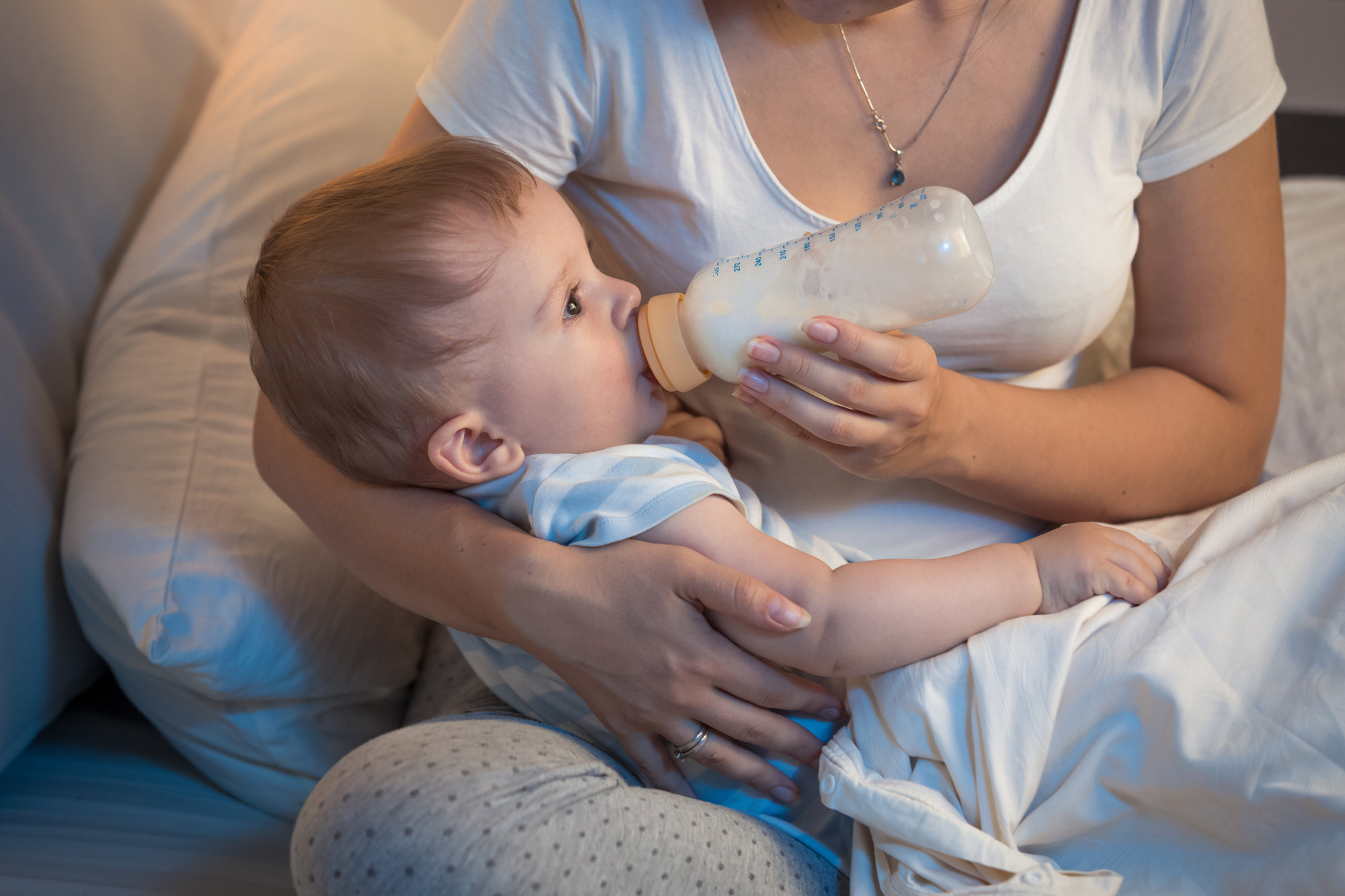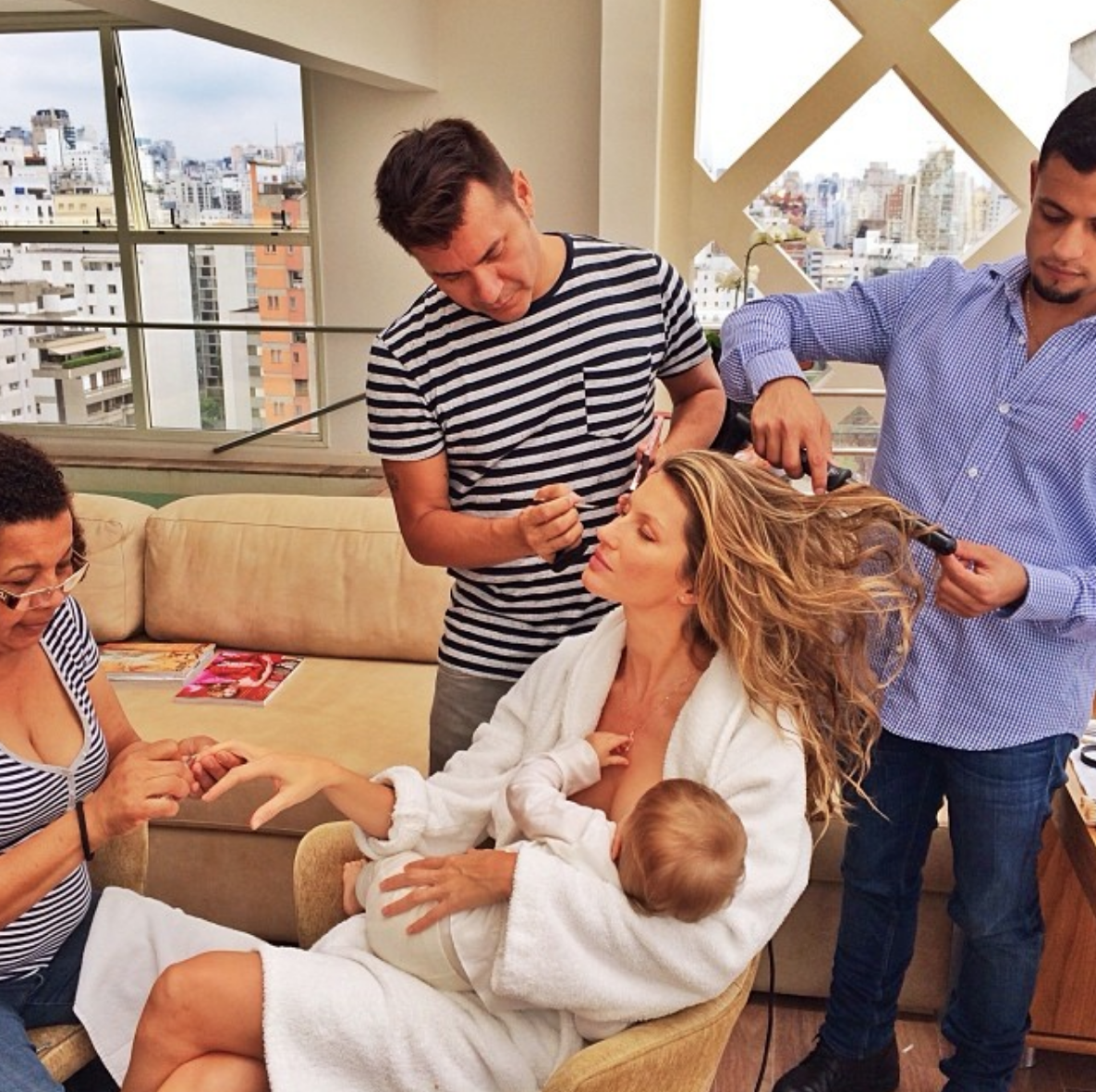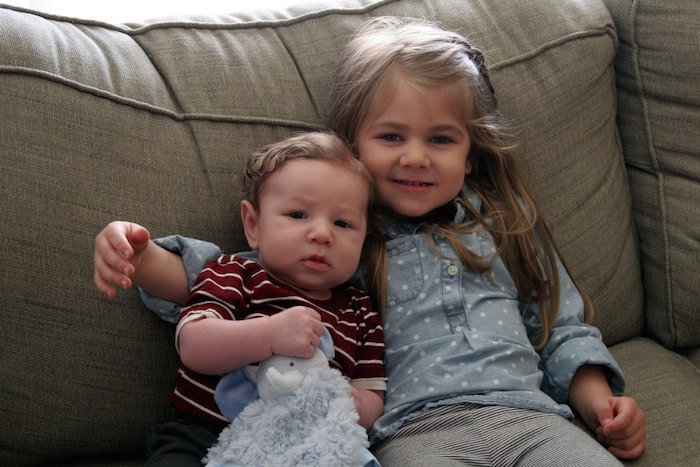The truth of motherhood in 2017 is that most of us feel like we’re failing. Behind our filtered Instagram posts and our #Blessed status updates, there’s a pervasive, nagging feeling that we aren’t quite doing it right, that we’re not enough, that other moms are doing it better. In a recent piece in Time magazine, writer Claire Howorth blames this on the Goddess Myth: the lie we’re sold that every aspect of motherhood should be effortlessly beautiful and natural, and if it isn’t that way for you, you’re probably doing it wrong. As Howorth writes, it’s the belief that “breast is best; that if there is a choice between a vaginal birth and major surgery, you should want to push; that your body is a temple and what you put in it should be holy; that sending your baby to the hospital nursery for a few hours after giving birth is a dereliction of duty. Oh, and that you will feel — and look — radiant.” As moms, we’re inundated daily with messages about what we should be doing, whether it’s an article that warns us we’re costing our babies precious IQ points by using formula, a well-meaning friend who gives us a copy of Ina May’s Guide to Childbirth as a baby shower gift, or even just the constant stream of perfect motherhood posts we see on social media. We all remember Beyonce’s ethereal pregnancy announcement, and who can forget that utterly unattainable Gisele Bundchen breastfeeding photo seen ‘round the world? Ashley Austrew In my tenure as a mother, I’ve also failed at cloth diapering (too much laundry), babywearing (ouch, my back), making my own organic baby food (pain in the ass), co-sleeping, and not using a pacifier. I prefer old-fashioned, “chemical”-laden diaper cream to coconut oil, and I could never quite shake the nagging fear that an amber teething necklace might strangle my baby. As time has gone by, I’ve become more confident in my choices and less ashamed to share my own unique version of motherhood. But I remember all too well how I felt that first year and the knot I had in my stomach whenever I saw my friends sharing stunning breastfeeding photos or when a stranger at the grocery store asked if I had a “natural” birth. More from CafeMom: If You Won’t Correct Your Kid’s Bad Behavior on the Playground, This Mom Will The idea that there’s a “right way” to mother our babies is pervasive, so much so that not only has it crept into our social media feeds and mom groups — it’s even altered the way hospitals and doctors treat us when we’re pregnant. A whopping 83 percent of hospitals now carry the baby-friendly designation that encourages mothers to room-in with their newborns, exclusively breastfeed, and never use a pacifier. This, despite warnings from several physicians that these guidelines could be detrimental to new moms, come with an increased risk of exhausted mothers accidentally smothering their babies, and, as Howorth reports, can even lead to sudden unexpected postnatal collapse, a rare but often fatal respiratory failure. Earlier this year, hospitals’ focus on breastfeeding, skin-to-skin, and rooming in came under fire when a mom went public with her tragic story that she accidentally smothered her miracle baby after she was instructed to breastfeed while on painkillers post-delivery. In February, another mom went viral with a warning to other parents after she accidentally starved her baby to death because she felt so much pressure to exclusively breastfeed. Obviously, not every story of a stressed or pressured mom ends in tragedies of this magnitude, but the pressure put on moms to parent a certain way is immense, and the shame we face when we fail is often difficult to bear. But it doesn’t have to be that way. As Howorth says, there’s a way to change the narrative, and that’s by owning our experiences, even when they don’t measure up to societal expectations. “Motherhood in the connected era doesn’t have to be dominated by any myth. Social media can just as easily help celebrate our individual experience and create community through contrast,” she writes. “Moms have to stick together even as we walk our separate paths. We have to spot the templates and realize there are no templates. We have to talk about our failures and realize there are no failures.” In other words, we have to let go of perfection, of the idea that there’s a right way and a wrong way to be nurturing, loving mothers. After all, a lack of caring is not the issue here; each decision we make is with the benefit of our children in mind, and we all have stories of disappointment and guilt we’ve shouldered when we’ve “failed” to do what’s “best” for our kids. But there’s something to be said for making decisions based on what’s best for ourselves as well. In motherhood, sometimes the choices we make in the interests of our children and of self-preservation won’t always fit into the “goddess” narrative, and that’s okay. I’m done letting guilt and shame have a say in how I birth and feed and diaper and love my babies. Ashley Austrew My children are happy, healthy, and thriving, even in the face of all of my supposed “failures” as a mother. I’ve fought hard to do right by my kids, I’ve learned how to parent on the fly, and I’ve given them the very best of me since the minute they were born. And I refuse to believe there’s an epidural, pacifier, stroller, or store-bought chicken nugget in the world that makes me less of a mom.




title: “I M Failing At Natural Parenting I M Done Being Ashamed Of It” ShowToc: true date: “2024-09-17” author: “Anne Knutsen”
The truth of motherhood in 2017 is that most of us feel like we’re failing. Behind our filtered Instagram posts and our #Blessed status updates, there’s a pervasive, nagging feeling that we aren’t quite doing it right, that we’re not enough, that other moms are doing it better. In a recent piece in Time magazine, writer Claire Howorth blames this on the Goddess Myth: the lie we’re sold that every aspect of motherhood should be effortlessly beautiful and natural, and if it isn’t that way for you, you’re probably doing it wrong. As Howorth writes, it’s the belief that “breast is best; that if there is a choice between a vaginal birth and major surgery, you should want to push; that your body is a temple and what you put in it should be holy; that sending your baby to the hospital nursery for a few hours after giving birth is a dereliction of duty. Oh, and that you will feel — and look — radiant.” As moms, we’re inundated daily with messages about what we should be doing, whether it’s an article that warns us we’re costing our babies precious IQ points by using formula, a well-meaning friend who gives us a copy of Ina May’s Guide to Childbirth as a baby shower gift, or even just the constant stream of perfect motherhood posts we see on social media. We all remember Beyonce’s ethereal pregnancy announcement, and who can forget that utterly unattainable Gisele Bundchen breastfeeding photo seen ‘round the world? Ashley Austrew In my tenure as a mother, I’ve also failed at cloth diapering (too much laundry), babywearing (ouch, my back), making my own organic baby food (pain in the ass), co-sleeping, and not using a pacifier. I prefer old-fashioned, “chemical”-laden diaper cream to coconut oil, and I could never quite shake the nagging fear that an amber teething necklace might strangle my baby. As time has gone by, I’ve become more confident in my choices and less ashamed to share my own unique version of motherhood. But I remember all too well how I felt that first year and the knot I had in my stomach whenever I saw my friends sharing stunning breastfeeding photos or when a stranger at the grocery store asked if I had a “natural” birth. More from CafeMom: If You Won’t Correct Your Kid’s Bad Behavior on the Playground, This Mom Will The idea that there’s a “right way” to mother our babies is pervasive, so much so that not only has it crept into our social media feeds and mom groups — it’s even altered the way hospitals and doctors treat us when we’re pregnant. A whopping 83 percent of hospitals now carry the baby-friendly designation that encourages mothers to room-in with their newborns, exclusively breastfeed, and never use a pacifier. This, despite warnings from several physicians that these guidelines could be detrimental to new moms, come with an increased risk of exhausted mothers accidentally smothering their babies, and, as Howorth reports, can even lead to sudden unexpected postnatal collapse, a rare but often fatal respiratory failure. Earlier this year, hospitals’ focus on breastfeeding, skin-to-skin, and rooming in came under fire when a mom went public with her tragic story that she accidentally smothered her miracle baby after she was instructed to breastfeed while on painkillers post-delivery. In February, another mom went viral with a warning to other parents after she accidentally starved her baby to death because she felt so much pressure to exclusively breastfeed. Obviously, not every story of a stressed or pressured mom ends in tragedies of this magnitude, but the pressure put on moms to parent a certain way is immense, and the shame we face when we fail is often difficult to bear. But it doesn’t have to be that way. As Howorth says, there’s a way to change the narrative, and that’s by owning our experiences, even when they don’t measure up to societal expectations. “Motherhood in the connected era doesn’t have to be dominated by any myth. Social media can just as easily help celebrate our individual experience and create community through contrast,” she writes. “Moms have to stick together even as we walk our separate paths. We have to spot the templates and realize there are no templates. We have to talk about our failures and realize there are no failures.” In other words, we have to let go of perfection, of the idea that there’s a right way and a wrong way to be nurturing, loving mothers. After all, a lack of caring is not the issue here; each decision we make is with the benefit of our children in mind, and we all have stories of disappointment and guilt we’ve shouldered when we’ve “failed” to do what’s “best” for our kids. But there’s something to be said for making decisions based on what’s best for ourselves as well. In motherhood, sometimes the choices we make in the interests of our children and of self-preservation won’t always fit into the “goddess” narrative, and that’s okay. I’m done letting guilt and shame have a say in how I birth and feed and diaper and love my babies. Ashley Austrew My children are happy, healthy, and thriving, even in the face of all of my supposed “failures” as a mother. I’ve fought hard to do right by my kids, I’ve learned how to parent on the fly, and I’ve given them the very best of me since the minute they were born. And I refuse to believe there’s an epidural, pacifier, stroller, or store-bought chicken nugget in the world that makes me less of a mom.



